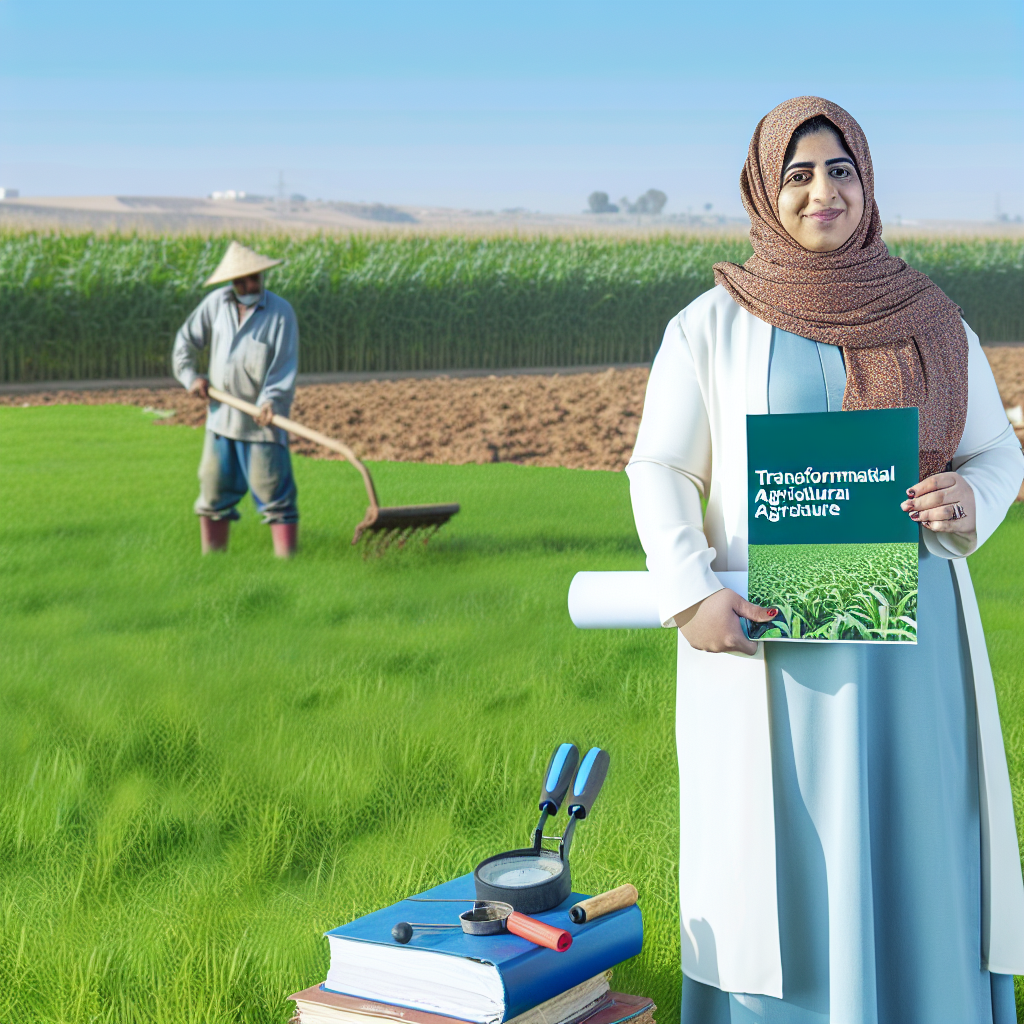Introduction to Rural Development Policies and Their Importance
Rural development policies play a vital role in enhancing agricultural sustainability.
These policies address economic challenges faced by rural communities.
Additionally, they promote environmental stewardship among farmers.
Effective policies ensure equitable access to resources and opportunities.
Consequently, rural development policies foster resilience against economic shocks.
Significance of Sustainable Agriculture
Sustainable agriculture ensures food security for current and future populations.
It minimizes ecological footprints while maximizing productivity.
Moreover, it encourages the conservation of essential natural resources.
Enhancing Economic Viability
Rural development policies increase income opportunities for farmers.
They can facilitate access to markets and reduce barriers to entry.
Furthermore, these policies can provide financial assistance for sustainable practices.
Supporting Community Development
These policies often include measures to strengthen rural infrastructure.
Investments in transportation and communication boost local economies.
Likewise, they create job opportunities that retain young people in rural areas.
Encouraging Cooperative Efforts
Cooperative models maximize resources and knowledge sharing among farmers.
Transform Your Agribusiness
Unlock your farm's potential with expert advice tailored to your needs. Get actionable steps that drive real results.
Get StartedRural policies can encourage collective bargaining for better prices.
Additionally, cooperatives can provide access to training and technology.
Addressing Climate Change
Rural development policies help farmers adapt to climate impacts.
They promote practices that enhance soil health and reduce emissions.
Moreover, these policies can facilitate access to climate-resilient crops.
Fostering Innovation and Technology
Support for research and development is crucial for sustainable agriculture.
Rural policies can fund agricultural innovation and technology adoption.
Subsequently, these advancements can lead to more efficient farming methods.
Key Principles of Sustainable Agriculture
Ecological Integrity
Sustainable agriculture prioritizes ecological integrity in all practices.
It focuses on preserving natural resources and protecting ecosystems.
Farmers adopt methods that promote soil health and water conservation.
Moreover, they minimize the use of harmful chemicals and pesticides.
Economic Viability
This approach ensures that farming remains financially feasible for producers.
Farmers use diversified production systems to spread risk and improve income stability.
They also engage in fair trade practices that benefit local communities.
In addition, supporting local markets drives economic growth in rural areas.
Social Equity
Sustainable agriculture promotes social equity among all stakeholders.
It encourages inclusive practices that empower marginalized communities.
Farmers collaborate with local organizations to share knowledge and resources.
Additionally, they focus on creating fair labor conditions and wages.
Innovative Technologies
Adopting innovative technologies enhances sustainable farming practices.
Farmers implement precision agriculture to optimize resource use effectively.
Furthermore, they use renewable energy sources to reduce carbon footprints.
Technological advancements also aid in monitoring crop health and yields.
Showcase Your Farming Business
Publish your professional farming services profile on our blog for a one-time fee of $200 and reach a dedicated audience of farmers and agribusiness owners.
Publish Your ProfileResilience to Climate Change
Preparing for climate change is crucial for sustainable agriculture.
Farmers adopt climate-smart practices to improve resilience.
These include crop rotation, agroforestry, and water management techniques.
Such practices help mitigate the effects of extreme weather events.
Analysis of Current Rural Development Policies Supporting Sustainable Agriculture
Overview of Existing Policies
Current rural development policies aim to promote sustainable agriculture.
These policies include financial support, training programs, and resource allocation.
Moreover, they focus on encouraging eco-friendly practices among farmers.
Financial Support Mechanisms
Many governments offer subsidies for sustainable farming practices.
These subsidies help farmers transition to organic methods and reduce reliance on chemicals.
Additionally, grants are available for adopting modern irrigation systems.
Low-interest loans further encourage investments in sustainable technologies.
Training and Education Initiatives
Training programs educate farmers on sustainable practices and methods.
These workshops cover soil health, crop rotation, and pest management.
Furthermore, partnerships with universities enhance knowledge sharing.
Such initiatives empower farmers to implement effective strategies sustainably.
Community-Based Approaches
Community involvement is crucial for successful rural development initiatives.
Local organizations often facilitate awareness campaigns and workshops.
They also foster collaboration among farmers to share best practices.
Consequently, these efforts create a supportive network for sustainable agriculture.
Evaluation of Policy Effectiveness
Assessing the effectiveness of these policies is essential for improvement.
Regular evaluations help identify successful programs and areas needing change.
Data collection, feedback, and analysis inform future policy adjustments.
Transparency in this process builds trust among farmers and policymakers alike.
Challenges in Policy Implementation
Despite positive intentions, challenges remain in implementing these policies.
Limited access to information can hinder farmers’ engagement in sustainable practices.
Additionally, financial constraints may prevent broader adoption of techniques.
This necessitates a more focused approach on outreach and education.
Future Directions for Policy Development
Future rural development policies must prioritize adaptability and innovation.
Policy frameworks should foster joint ventures between private and public sectors.
Additionally, integrating technology and digital tools can enhance monitoring and support.
Ultimately, ongoing collaboration ensures policies meet evolving agricultural needs.
Find Out More: Impact Of Conservation Programs On Farm Productivity
Case Studies: Successful Implementation of Sustainable Agricultural Practices
Innovative Solutions in Green Valley Farm
Green Valley Farm adopted organic practices to enhance soil health.
This method improved crop yield significantly over three years.
Farmers embraced cover cropping to prevent soil erosion.
They also utilized organic fertilizers and pest management strategies.
As a result, biodiversity on the farm increased remarkably.
Community-Led Initiatives at Willow Creek
Willow Creek community initiated a cooperative farming project.
This effort focused on rainwater harvesting and conservation techniques.
The community trained local farmers in sustainable farming methods.
Showcase Your Farming Business
Publish your professional farming services profile on our blog for a one-time fee of $200 and reach a dedicated audience of farmers and agribusiness owners.
Publish Your ProfileThese practices improved water management across the region.
In turn, local crops thrived, fostering economic resilience.
Technological Advancements in Oceanview Farms
Oceanview Farms implemented precision agriculture technologies.
They used data analytics to optimize irrigation and nutrient use.
This technology reduced water consumption by 30 percent.
Additionally, crop monitoring tools helped increase efficiency.
Farmers witnessed a significant boost in overall productivity.
Collaborative Research in Mountain Ridge
Mountain Ridge partnered with universities for sustainable research.
This collaboration explored agroecological methods and their benefits.
Through experiments, researchers identified best practices for local conditions.
The findings guided farmers in adopting new techniques.
This innovative approach enhanced yields while preserving natural resources.
Gain More Insights: Adapting Farm Operations To New Import Export Tariffs
The Role of Technology in Promoting Sustainable Agricultural Techniques
Enhancing Productivity
Technology significantly boosts agricultural productivity.
Modern tools streamline various farming processes.
For instance, precision agriculture allows targeted use of resources.
This technique minimizes waste and maximizes yields.
Farmers can use drones to monitor crop health effectively.
Improving Resource Management
Technological innovations aid in efficient resource management.
Smart irrigation systems optimize water usage.
These systems reduce overuse and promote conservation.
Additionally, software tools help track soil health.
This data enables timely interventions for soil improvement.
Supporting Sustainable Practices
Technology promotes the adoption of sustainable practices.
Farm management software helps farmers implement crop rotation.
Climate monitoring tools guide farmers in making informed decisions.
These technologies reduce dependency on harmful chemicals.
Consequently, they enhance environmental sustainability.
Facilitating Market Access
Technology improves farmers’ access to markets.
Online platforms connect producers directly with consumers.
This approach reduces reliance on intermediaries.
As a result, farmers can receive fairer prices for their products.
Moreover, e-commerce expands the reach of local produce.
Boosting Knowledge and Skills
Technology serves as a powerful education tool.
Webinars and online courses share best practices with farmers.
Mobile apps provide real-time information on crop management.
Farmers can learn about latest sustainable techniques efficiently.
This access to knowledge empowers rural communities.
Explore Further: Key Steps To Achieve Pesticide Compliance

Impact of Government Incentives on Farmers’ Adoption of Sustainable Practices
Understanding Government Incentives
Government incentives provide financial support to farmers.
Showcase Your Farming Business
Publish your professional farming services profile on our blog for a one-time fee of $200 and reach a dedicated audience of farmers and agribusiness owners.
Publish Your ProfileThese incentives often include grants, tax breaks, and subsidies.
Many farmers rely on these programs to adopt sustainable practices.
These incentives motivate farmers to transition to environmentally friendly methods.
Types of Incentives Encouraging Adoption
Direct subsidies reduce the financial burden for farmers.
These funds can cover the costs of sustainable equipment or technology.
Tax incentives further encourage investment in sustainable practices.
Farmers may receive deductions on eco-friendly investments.
Low-interest loans allow farmers to afford sustainable upgrades.
Case Studies of Successful Implementation
In the Midwest, a program increased organic farming by 25%.
Farmers received training and financial support for organic practices.
Such efforts led to better soil health and higher yields.
Additionally, a Southern state saw a rise in water conservation efforts.
Incentives for drip irrigation systems significantly reduced water usage.
Challenges to Incentive Effectiveness
Some farmers may not qualify for available programs.
Administrative hurdles can cause delays in receiving funds.
Also, lack of awareness limits participation in these programs.
Finally, the complexity of regulations can deter adoption.
Future Outlook and Recommendations
Streamlining application processes could improve participation rates.
Increased outreach might raise awareness of available incentives.
Moreover, offering more targeted incentives can enhance effectiveness.
Collaboration with local agricultural organizations can aid implementation.
Ultimately, enhancing these incentives will promote sustainable practices.
Gain More Insights: Strategies For Reducing Chemical Dependency In Agriculture
Collaboration Between Local Governments and Agricultural Communities
Importance of Partnership
Collaborative efforts boost local economies and improve agricultural practices.
Such partnerships enhance resource sharing and pooling of financial assistance.
They also foster innovation and adaptability within farming practices.
Strategies for Effective Collaboration
Local governments can involve agricultural communities in decision-making processes.
This approach ensures farmers’ needs are prioritized and addressed effectively.
Moreover, establishing regular meetings encourages open communication channels.
Subcommittees can focus on specific issues like sustainable practices and funding.
Training and Support Programs
Local governments should initiate training programs for farmers.
Such programs can cover best practices in sustainable agriculture.
Additionally, workshops on financial management can be immensely beneficial.
Farmers will feel more empowered to adopt new technologies and methods.
Examples of Successful Collaborations
The Green Valley Initiative highlights effective partnerships in sustainable farming.
This program combines local government resources and farmer input for success.
Another example is the Farmers’ Alliance, which focuses on cooperative marketing.
These models can inspire similar initiatives in other regions.
Overcoming Challenges
Collaboration often faces resistance from traditional farming practices.
Education and awareness campaigns can help mitigate these challenges.
Showcase Your Farming Business
Publish your professional farming services profile on our blog for a one-time fee of $200 and reach a dedicated audience of farmers and agribusiness owners.
Publish Your ProfileFurthermore, showcasing success stories encourages wider acceptance.
Patience and persistence are key to fostering effective collaborations.
Future Trends in Rural Development Policies for Sustainable Agriculture
Technological Integration
Technology plays a crucial role in modern agriculture.
Policy makers increasingly promote precision farming techniques.
These methods enhance efficiency and reduce waste.
Innovative tools, like drones, monitor crop health effectively.
Moreover, data analytics provides insights for informed decision-making.
Support for Local Farmers
Empowering local farmers is vital for sustainable development.
Policies should focus on providing accessible funding options.
Grants and low-interest loans can help farmers adopt sustainable practices.
Furthermore, training programs will equip farmers with new skills.
Climate Resilience Strategies
Climate change poses significant challenges to agriculture.
Thus, developing resilient farming methods is essential.
Policies should incentivize climate-smart agricultural practices.
Crop rotation and agroforestry can mitigate climate risks.
Additionally, promoting water conservation techniques enhances resilience.
Collaboration with Communities
Engaging with rural communities strengthens policy effectiveness.
Community involvement ensures policies meet local needs.
Farmers should have a voice in decision-making processes.
Building partnerships between farmers and local organizations promotes collaboration.
Funding and Investment Opportunities
Robust funding mechanisms are necessary for sustainable agriculture.
Public-private partnerships can drive investment in rural areas.
Long-term funding commitments encourage agricultural innovation.
Support for research in sustainable practices will yield benefits.
Market Access and Fair Trade Practices
Expanding market access is crucial for rural economies.
Policies should prioritize fair trade standards for agricultural products.
Encouraging local markets can strengthen community ties.
Online platforms also provide new avenues for farmers to sell products.
Regulatory Support and Stabilization Policies
Effective regulations can guide sustainable agricultural practices.
Stabilizing prices can protect farmers during economic fluctuations.
Policies should also promote organic certification and labeling.
Encouraging biodiversity through regulatory measures strengthens ecosystems.




